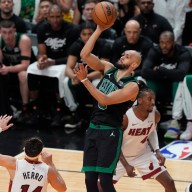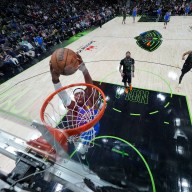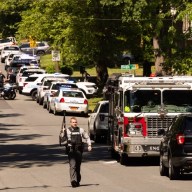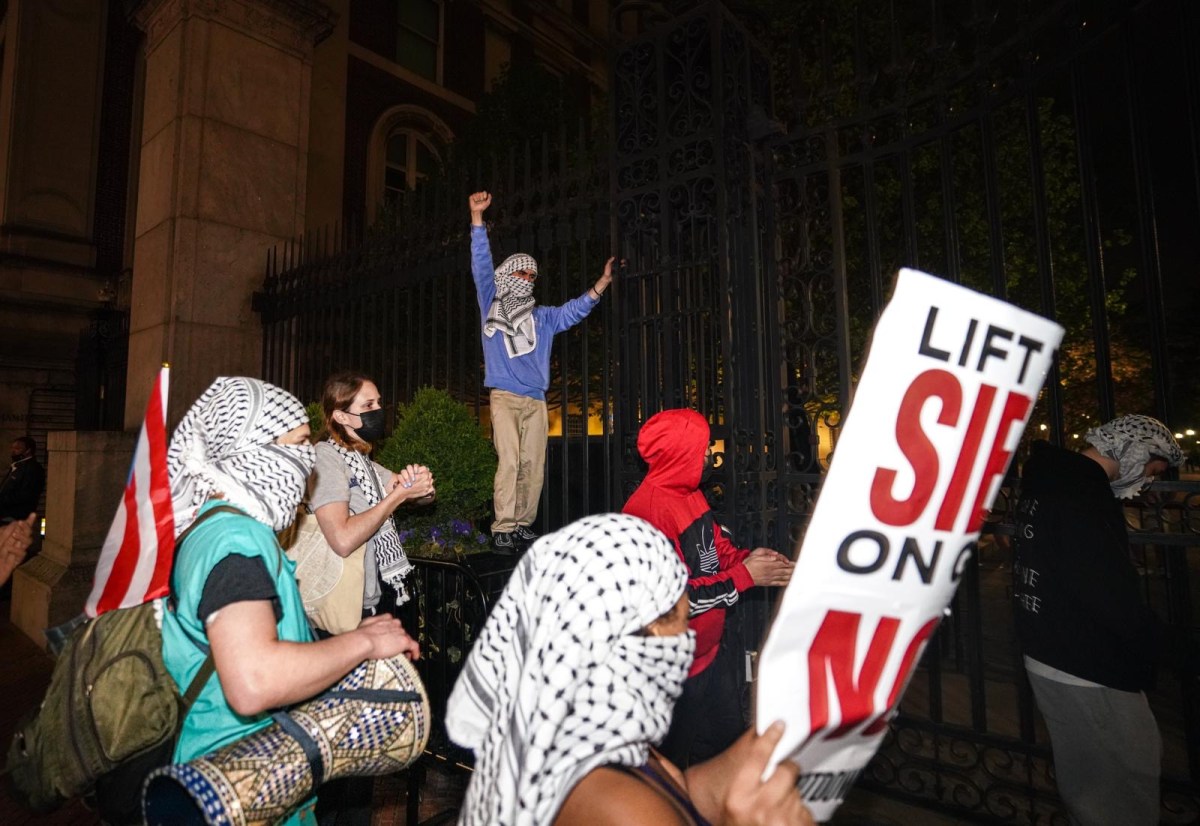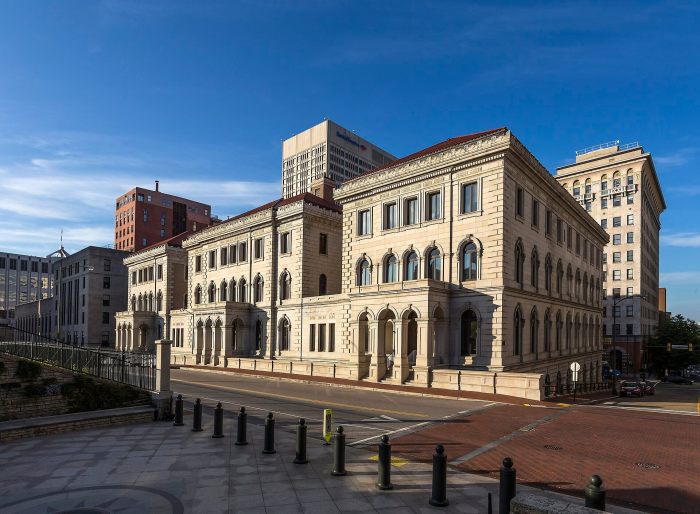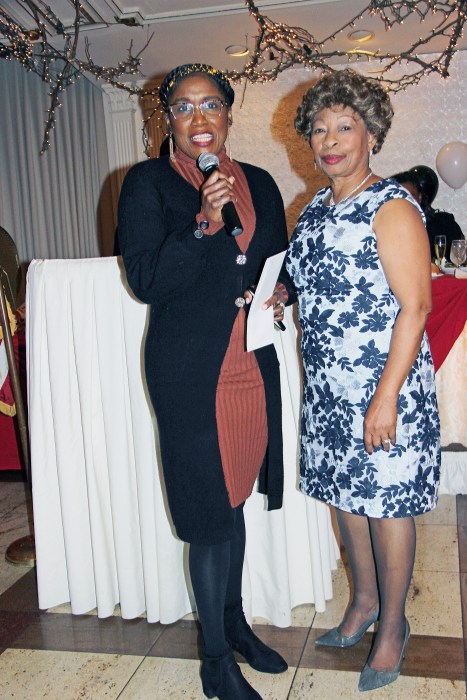There was a lot at stake as Bruce Springsteen and the E Street Band took the stage at the Apollo Theater on Friday night. The concert, to celebrate the 10th anniversary of SiriusXM satellite radio, would not only be the band’s first at the hallowed Harlem hall, but it would be their first without sax player Clarence Clemons, who died last June.
That they began their Wrecking Ball tour with such an intimate gig at the theater where legendary soul greats from Ella Fitzgerald to Sam Cooke cut their teeth would have meant a lot to Clemons, who told Metro in 2009 that he “always wanted to see more black people in the audience.”
Before launching into “We Take Care of Our Own,” the Boss hilariously announced himself as “the hardest working white man in show business,” paraphrasing the speech that begins James Brown’s legendary 1963 “Live at the Apollo” album.
Throughout the performance Springsteen seemed appropriately aware that the Big Man’s ghost hung heavy in the air. In a particularly soulful rendition of “My City in Ruins,” he announced the band, which in addition to the regular E Streeters, was made up of a three-piece chorale and a five-piece horn section that included Clarence’s nephew, Jake Clemons. After the introductions of all that were physically present, he asked the crowd if he was missing anybody.
The fifth song in, it was the first chance to celebrate the lives of Clemons and E Street keys player Danny Federici, who died in 2008. And the crowd erupted as the dual meaning of “missing” anybody sunk in. With a determined confidence in his eye, Springsteen intoned, “If you’re here, and we’re here, they’re here.”
He repeated this a few times as the breakdown ramped back up into the chorus, and with each time he said this mantra, his own belief in his words became more evident. It was a reminder that one of Springsteen’s strongest qualities as a songwriter and a performer is this demonstration that he truly believes in his words.
Later in the set, during “Tenth Avenue Freeze-Out,” where the lyrics call for a shout out to “when the Big Man joined the band,” Springsteen encouraged the crowd to cheer in what amounted to being the exact opposite of a moment of silence. But this moment was probably even more respectful to the legacy of the saxophone player.
Most of the set was made up of tracks from the new “Wrecking Ball” album, which was released this past Tuesday. Many of the selections that weren’t from the new album were well-chosen complements to the themes and sounds of “Wrecking Ball.”
As “The Rising” album was informed by a world that was coming to grips with the aftermath of 9/11, “Wrecking Ball” is informed by the same class consciousness that led to the Occupy movement. Springsteen introduced “Mansion on the Hill,” a delicate acoustic classic about the differences between the haves and the have-nots, by sharing that he wrote the song after the recession of the Carter administration, at the beginning of “a 30-year arc that would show the country growing farther apart.” He re-imagined the song as a duet with his wife Patti Scialfa. The performance was a little shaky, but it holds promise for future renditions if they keep it on the setllist throughout the tour.
There were other slight missteps too, as the band ran through an acapella intro to The Temptations’ “The Way You Do the Things You Do” and the Wilson Pickett classic “634-5789 (Soulsville U.S.A.),” but these covers were clearly venue-related tributes and all in good fun. It also was refreshing and humanizing to see a few mistakes from somebody so notorious for riding his band so hard that he was nicknamed The Boss. Springsteen also more than made up for any errors by climbing up on the Apollo’s balcony to sing the latter song.
This shakiness that leaked into the set a few times was the sound of a band finding their feet again after a huge loss, and possibly struggling with reinvention. If there is any complaint with the 2012 E Street Band it is that this reinvention at times seems derivative. But what’s oddest is that it is mostly derivative of the Arcade Fire, a band whose second album was criticized for being derivative of Springsteen.
The other touchstone for the band’s new sound is just as unlikely, the Dropkick Murphys. Springsteen has spoken at length about how his son got him into that Boston band, but Arcade Fire and Dropkick Murphys are hardly cut from the same cloth, aside from the fact that Dropkicks multi-instrumentalist Tim Brennan bears at least a passing resemblance to Arcade Fire singer Win Butler. (OK, so maybe one looks like the older brother of the other.)
This isn’t the first time that Springsteen has been under the influence of younger groups — he has stated openly the debt he owes to1970s NYC synth punks Suicide — it’s just surprising to see a suit vest-clad Boss dancing a jig on “Death to My Hometown” and to see the band members banging on Revolutionary War drums while all yelling “woahhh oohhhh” in unison on “We Are Alive.”
But it’s not like Springsteen is just stealing back what others have taken from him. He makes these sounds his own. And these aren’t the only new musical style he embraces. There’s even a rap on the new album! And in concert, vocalist Michelle Moore delivered said rap in a way that made it seem in perfect accord with everything else in the Springsteen canon.
Springsteen has always found a good balance between keeping up with the times and defining them, and this borrowing is not all bad. The borrowing simply demonstrates that at 62, he is still growing as an artist and finding joy within his craft and the craft of his contemporaries, even through the sorrow of losing such a dear partner in music. As he once encouraged, all we need to do is show a little faith.

